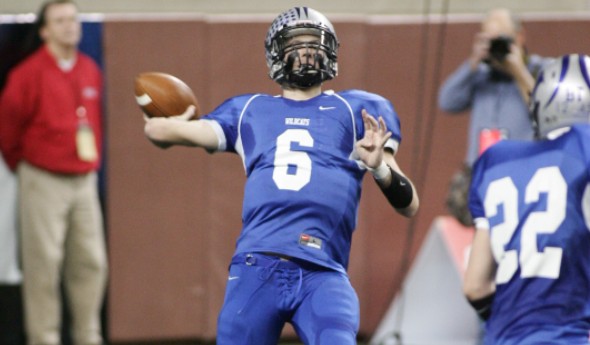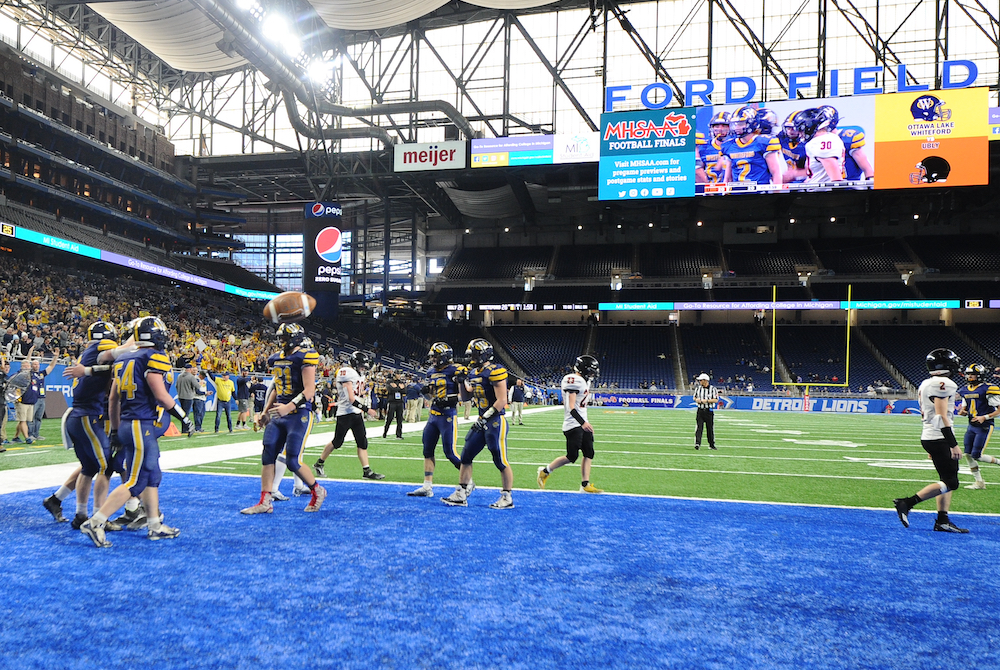
Moment: Montague, Kater Air it Out
October 1, 2020
By John Johnson
MHSAA Director of Broadcast Properties
A lot of people say in any sport that there’s a play, or a sequence of plays, that swings a game – that locks down the outcome.
You might be able to define “swing” with a defensive red zone stop and the longest pass play in MHSAA Football Finals history during the 2008 Division 6 championship game.
Montague quarterback Cody Kater found Anthony Root down the right sideline for a pitch and catch that went for 98 yards and squashed a potential comeback by Leslie in a 41-20 win for the Panthers at Ford Field.
The swing began just three plays earlier, when the Montague defense stopped Leslie on downs deep in its own territory with about four minutes to play in the first half. The Blackhawks were knocking on the door, looking to cut into a 21-6 lead when a 4th-and-goal pass fell incomplete.
The Panthers were backed up, but they didn’t back down.
“They thought they had us and, boom, we’re 98 yards the other way,” Kater said to the Detroit Free Press. “I think the ball had even gotten tipped a little bit, but Anthony made a great play.” The pair had already connected for a 46-yard scoring pass in the first quarter.
Montague continued the swing moments later with a pass interception by Jordan Degen with a minute to play that led to a TD run by A.J. LaRue, which gave the Wildcats a 35-6 halftime lead.
Kater was an efficient 4 of 6 passing for 175 yards in the game, while Root accounted for 144 of that total with his two scoring catches. The Wildcats defense forced four turnovers.
PHOTO: Montague's Cody Kater launches a pass from his team's end zone in 2008 that turned into a 98-yard reception, the longest in MHSAA Finals history.

Set, Ready, Challenge: 11-Player Football Finals Challenges New in 2022
By
Jon Ross
MHSAA Director of Broadcast Properties
November 25, 2022
New this year at the MHSAA 11-Player Football Finals is the opportunity for head coaches to challenge a call.
In previous years, all potential scoring plays and potential turnovers were automatically reviewed. That process will continue and now, under a limited set of circumstances, the head coach can challenge calls.
To do so, the head coach must first call a timeout. If a team has no timeouts remaining, they are not able to challenge a call. Challenges must be presented to the officials immediately after the timeout is granted. If the challenge is successful, the team will get its timeout back and have the ability to challenge one more call during regulation. A second successful challenge will not result in the ability to challenge a third call.
The following plays are reviewable by challenge:
- Complete/incomplete passes
- Runner/receiver in/out of bounds
- Runner ruled not down
- Forward progress spot as it relates to the yard to gain
- First touching of a kick
- Recovery of a ball in/out of bounds
- Forward/backward pass
- Penalties called on the field only for:
- Illegal forward pass
- Targeting or illegal helmet contact
- Pass interference only as it relates to the pass being previously tipped
NOTE: All other penalties called on the field are not reviewable. These include, but are not limited to: illegal formation, ineligible receivers downfield, illegal participation, illegal substitution or delay of game. If a penalty is not called by the officials on the field, the play can never be reviewed to retroactively call a penalty.
In overtime, challenges – like timeouts – reset. Each team has the ability to challenge one call for the entirety of overtime, but must have a timeout to use to do so. A successful challenge in overtime will not result in the ability to challenge a second call.
If a play is overturned in regulation or overtime, the replay officials will correct all aspects of the play including time, position of the ball and whether the clock will be started on the RFP or snap. The game clock or play clock may be reviewed only as it directly relates to the overturning of a call on the field.
There is no change to the review of potential scoring and potential turnover plays. Those plays are automatically looked at by the replay official and replay assistant. If the replay official can confirm the ruling on the field without stopping play, the official will do so. If more time is needed to review the play, the on-field referee will announce that and then will announce the replay official’s decision. For a play to be reversed, there must be indisputable video evidence that shows the original call was incorrect. Every attempt will be made to complete the review process in 90 seconds or less.
The addition of the coach’s challenge was approved by the MHSAA’s Representative Council at its May 2022 meeting.

